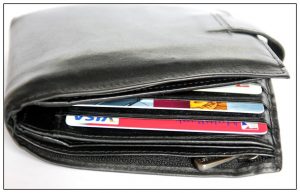You’re driving to the grocery store, a trip you’ve made a thousand times. Out of nowhere comes a car running the red light at the intersection you’re crossing – heading straight toward you! Crash!! You’re hurt, stunned and quite possibly in shock.
The police and ambulance arrive. First they ask questions about the accident, most of which you can answer. Then they ask about medications you take, allergies and an emergency contact’s phone number. Your mind goes blank. You are taken to the hospital but you’re unable to give the ER doctors any information that could help them treat you.
Accidents can happen anywhere, anytime to anyone, especially as we’re getting into the busy travel season. What can you do?
Create an Emergency Card containing your critical information to keep with you at all times. Organize it in an easy-to-read format. My Emergency Card is set up in a multi-column format. I recommend it be typed using a plain font and printed on heavy paper or card stock.
However you organize your Emergency Card, start with Emergency Info For. Under that, put your full name and address.
Suggested column headings are:
For 3-6, make a list. For 7-9, include full name, phone number and address.
Add any information you think is important.
Make the card small enough to keep in your wallet with your health insurance ID card, driver’s license and car registration. If you plan to be an organ donor, be sure it’s noted on your driver’s license or have a signed Organ Donor Card. Don’t keep the information in your phone if your phone is locked because it cannot be accessed. However, if your phone is unlocked, put the info in Contacts labeled ICE (in case of emergency). First-responders should know to go to your wallet or phone for this information.
Having an Emergency Card could be a life-saver.
 Brrrr…it’s cold in most of the country. We spend more time indoors. What’s your favorite indoor activity? I bet reading immediately sprang to mind!
Brrrr…it’s cold in most of the country. We spend more time indoors. What’s your favorite indoor activity? I bet reading immediately sprang to mind!
Is your book collection organized so you can find just the right book you’re in the mood to read? Excellent! Or like many folks, are books scattered around the house? Do you even know what books you have? Do you regularly purge unwanted books or let them continue to occupy valuable space and collect dust?
Now is a great time to organize your books. Here are 11 tips.
My largest book organizing project was 17 years ago with my first client. In his library he had between 1,000 and 2,000 books. They were out of order. There were duplicates and triplicates. His library was completely nonfunctional. It took time, but after donating many of them and organizing the rest according to my client’s preferences, that massive job got done. My client was thrilled to have a functional library that looked great too!
For my personal collection, I mix it up. Fiction books are arranged in alphabetical order by author’s last name. Books in other categories (such as organizing, business and design) are separated by category but not in any order. Some books are vertical. Some are horizontal. Small framed photos and pieces of art add to the overall look. I donate books that no longer interest me. My book collection is functional and attractive. With a little time and effort, yours can be too.
Downsizing and organizing your books is worth doing. Then, when planning your next vacation, you can quickly grab the ones you want to read – much better than wasting time searching around the house or wasting money buying more at the airport.
Click on the above title to learn more about the featured author.
 The first day of Fall is September 22. Work and school are back in full swing. Managing your to-dos effectively is essential to maximizing your productivity at home and work.
The first day of Fall is September 22. Work and school are back in full swing. Managing your to-dos effectively is essential to maximizing your productivity at home and work.
A while ago I gave a presentation called “Stop Mumbling, Oops, I Forgot: How to Effectively Manage Your To-Dos.” With good intentions, people say they’ll do something but then forget because it wasn’t noted somewhere. People waiting for the promised ‘something’ to be done are disappointed. At work, this is a particularly bad practice. A good practice is to make notes on your to-do list or calendar so tasks are not forgotten.
Even with the best systems, life sometimes gets in the way. As John Lennon said, “Life is what happens to you while you’re busy making other plans.”
Case in point: I received an email from an attendee the next day. “My kids need completely different school supplies than what we bought, my husband suddenly needs to take his car into the shop, mom’s aide left early without doing the grocery shopping, and I have a report deadline at work tomorrow. How do I know what to do first?” Let’s call her Amy and her husband Michael.
I made these assumptions: The report will take Amy’s available time to complete, and Amy and Michael each need a car to get to work.
Following was my response.
First, Amy should complete the report and meet the deadline. Her job provides needed income and benefits, so she shouldn’t potentially put it at risk.
Second is Michael’s car. There are a few options. Have Michael find out if the auto shop provides a loaner car, ask someone to drive him from the shop to work (if convenient), call Uber/Lyft or wait for the car to be repaired.
Third comes food. Cereal, eggs and PB&J (or whatever is on hand) can fill bellies for a day. Other options include ordering food from a market with home delivery, ordering takeout with delivery, and asking the aide to get groceries the next time he/she’s on duty.
School supplies are fourth. Amy can order the supplies online with next-day delivery or pickup after work.
______________________________________________________________
General takeaway tips:
• Have the school provide in advance a list of needed supplies and buy them then.
• Schedule non-cancelable appointments with yourself to work on and complete reports and other important work well before the deadline to avoid a last-minute crises.
• Develop a Plan B to get to work in case of future car trouble or other emergency.
• Join AAA or another roadside-assistance plan.
• Keep the fridge and pantry stocked with essentials such as cereal, milk, bread, eggs, pasta, tuna, soup and frozen meals.
Having a contingency plan for emergency situations helps to make life less stressful. Who wouldn’t want a little less stress?
When life overwhelms you, stop and take a deep breath. Figure out what needs to be done and by when. Prioritize by most-to-least important. So, first do what needs immediate attention. If you find crisis situations happen too often, click HERE to contact a member of the Greater Philadelphia Chapter of the National Association of Professional Organizers for help.
Click on the title above to learn more about the featured author.
 My aunt’s friend Lee was driving home after having dinner with The Girls. All of a sudden she realized she didn’t have her handbag! She frantically tried to remember what was in it, especially in her wallet, but her mind went blank. Panicked, Lee called the restaurant. It wasn’t there. Although it seemed futile, she drove back to the restaurant. Between when she called and arrived, it had been found! Lee was lucky.
My aunt’s friend Lee was driving home after having dinner with The Girls. All of a sudden she realized she didn’t have her handbag! She frantically tried to remember what was in it, especially in her wallet, but her mind went blank. Panicked, Lee called the restaurant. It wasn’t there. Although it seemed futile, she drove back to the restaurant. Between when she called and arrived, it had been found! Lee was lucky.
If your wallet were lost or stolen, could you remember all the credit and membership cards, ATM and debit cards, medical insurance, driver’s license and registration cards, and the rest? Of course not. But even if you could, would you know the account numbers and contact info to report them missing? Not unless you have hyperthymesia or are a savant like Raymond Babbitt in Rain Man. And consider the many hours it would take to figure all this out.
To protect yourself, here are 9 tips.
If you think any of these options is too much trouble, ask yourself how much trouble it would be if your wallet were lost or stolen and you didn’t know its contents or the contact info. The payoff is having readily accessible information so you can take immediate action. We don’t intend to create opportunities for theft. But, if it happens, your record will be a vital resource. How thrilled would you be that you took time to protect yourself?
Click on the title above to learn more about the featured author.
 It’s a new year. You want to be your best self. Get organized. Lose weight. Exercise. These are some of the most popular resolutions (goals) year after year. Here’s a reality check: They are all great ideas but they are NOT goals.
It’s a new year. You want to be your best self. Get organized. Lose weight. Exercise. These are some of the most popular resolutions (goals) year after year. Here’s a reality check: They are all great ideas but they are NOT goals.
Why? Because they are too vague. How can you know if you’ve achieved them? What do you want to organize? How much weight do you want to lose? Do what for exercise? What’s the timeframe?
To be successful, remember this SMART acronym when creating goals.
S – Specific: Who, what, when, where, why
M – Measurable: Track progress and outcome
A – Achievable: Able to be accomplished
R – Realistic: Goal and timeframe work for you
T – Time-bound: Timeframe to start and, if applicable, end
Here are examples of SMART goals.
See the difference? On February 1st, if the bedroom is organized, you’ve lost five pounds or you’ve been walking two miles, four times a week, you’ve accomplished your goal! Conversely, if you haven’t met your goal, don’t give up. Just start anew.
Write down your goals. Schedule blocks of time in your calendar to work on them and honor those appointments as you would if they were with someone else. Close your eyes and imagine achieving your goal. Give yourself little rewards along the way.
Most important is motivation. Without it, you’re unlikely to succeed. If you’re not motivated on your own to organize your bedroom and it’s something you really want to do, find a photo of your dream bedroom and post it so you can see it every day. Think about how it would feel to actually live in this room. If you need help, ask a friend, family member, or professional organizer.
Have an organized 2016!
 Most people want to do the right thing and recycle, but sometimes it’s not easy. Outdated electronics, cans of oil-based paint, and piles of unwanted confidential documents take up valuable space in the basement or garage because you don’t know what to do with them. These things need to be discarded — but how?
Most people want to do the right thing and recycle, but sometimes it’s not easy. Outdated electronics, cans of oil-based paint, and piles of unwanted confidential documents take up valuable space in the basement or garage because you don’t know what to do with them. These things need to be discarded — but how?
There is confusion about recycling. Which things are considered household recycling and which are hazardous waste? You may be surprised to learn that nail polish is hazardous waste. Cellphones are hazardous waste, too. To add to the confusion, companies that pick up your household trash differ in what they accept: some take plastic containers marked 1 through 3 and others take 1 through 7. It’s no wonder people may be reluctant to recycle.
To help make it easier to get rid of your unwanted stuff, follow this list for electronics and hazardous waste recycling and shredding events through the fall in the Greater Philadelphia area. Events are either free or low-cost.
Note: Household batteries can be tossed with regular trash. However, for those with terminals on the same side (such as 6V, 9V or 12V) and button-cell batteries (used in watches, greeting cards and hearing aids), it is important to cover both ends with masking tape to reduce the risk of short-circuiting and fire. For the more common batteries (AA, AAA, C and D), cover the positive terminal (“+”) with masking tape.
Electronics Recycling
Following are permanent drop-off locations for four southeastern PA counties
(At the time of this post, no information for Bucks County was found).
Chester County
Chester County Solid Waste Authority accepts computers and peripherals at the Lanchester Landfill, 7224 28th Division Hwy — Contact Narvon at 610-273-3771
South East Chester County Refuse Authority
219 Street Road, West Grove 19390 — Contact Dawn Robinson at 610-869-2452 (ext. 11)
West Chester Borough
205 Lacey Street, West Chester 19382 — Contact Meghan Fogarty at 610-696-5282
Delaware County
Marple Township offers free electronic recycling to residents at:
Marple Township
446 Marpit Rd. Bromall 19008 — Contact Joe Romano at 610-356-4040
Springfield Township offers free electronic recycling to residents at:
Springfield Delco Public Works
1258 Church Rd., Springfield 19064 — Contact Jeff Bickel at 610-543-2837
Police Court Yard 24/7 or Public Works Facility 7 am – 3:30 pm
Montgomery County
Cheltenham Township – Residents can recycle electronics at:
Cheltenham Township Public Works Facility
8101 Old York Rd., Elkins Park 19027 — Contact William Ferrari at 215-635-4600
Mon. to Fri. 8 am – 3:30 pm, Sat. 10 am – 2 pm
East Greenville Recycling Center
620 West Side Alley, Pennsburg 18073 — 215-679-5194
Mon. to Fri. 7:30 am – 3:30 pm, Sat. 8 am – 12 pm
Lower Merion Township residents can recycle electronics at:
Robert J. Koegel Public Works Complex
1300 N. Woodbine Ave., Penn Valley 19072
Contact Joseph Przybyszewski at 610-667-1952
Mon. to Fri. 8 am – 3 pm, Sat. 9 am – 2:30 pm
Philadelphia County
Computers, monitors, TVs, cellphones and other e-waste are accepted at all HHW locations for residents only. Sanitation Convenience Centers are open Monday through Saturday, 8 am – 6 pm except City holidays. Click here for more info. See locations below.
West Philadelphia
5100 Grays Ave., 215-685-2600
Strawberry Mansion
2601 W. Glenwood Ave., 215-685-3981
Southwest Philadelphia
3033 S. 63rd St., near Passyunk Avenue, 215-685-4290
Northwest Philadelphia
300 block Domino Lane, near Umbria Street, 215-685-2502
Northeast Philadelphia
State Rd. & Ashburner Street, 215-685-8072
In addition –
Best Buy accepts most electronics and large appliances from residential customers at no charge.
Staples offers free technology recycling.
Household Hazardous Waste (HHW)
HHW events are from 9:00 am – 3:00 pm
Saturday, July 11
Spring-Ford 9th Grade Center (Montgomery County), 400 South Lewis Road, Royersford
Thursday, July 16
Streets Department Training Center (City of Philadelphia), 8401 State Rd. at Ashburner St., Philadelphia
Saturday, July 25
Central Bucks South High School (Bucks County), 1100 Folly Rd. Warrington
(enter off Pickertown Rd.)
Saturday, August 8
Abington Middle School (Montgomery County), 2056 Susquehanna Road, Abington
Saturday, August 15
Quakertown High School (Bucks County), 600 Park Ave., Quakertown
Saturday, August 22
Bucks County Technical High School (Bucks County), 610 Wistar Rd., Fairless Hills, (Bristol Township)
Saturday, September 12
Oxford School District Administration Bldg. (Chester County),125 Bell Tower Lane, Oxford
Saturday, September 19
Streets Department 3rd District Highway Yard (City of Philadelphia), 22nd St. & York St., Philadelphia
Sunday, September 20
Penn State University-Brandywine Campus (Delaware County), 25 Yearsley Mill Rd (Route #352), Media
Saturday, October 10
Streets Dept. Facility (City of Philadelphia), 3033 South 63rd St. (NW of Passyunk Ave.), Philadelphia
Government Services Center (Chester County), 601 Westtown Rd., West Chester
Saturday, October 17
Emergency Services Training Center (Delaware County), 1700 Calcon Hook Rd., Sharon Hill (Darby Twp.)
Sunday, October 18
Lower Merion Twp Public Works (Montgomery County), 1300 N. Woodbine Ave.(Lower Merion Twp.), Penn Valley
Saturday, November 7
Streets Department Northeast Facility (City of Philadelphia), 3901 Delaware Ave. (between Castor & Lewis, near Allegheny exit of I-95), Philadelphia
Shredding Events: There is no need to remove paper clips or staples.
Saturday, July 18, 2015, 10:00 – 12:00
Bryn Mawr Trust, Swarthmore Office, 330 Dartmouth Avenue, Swarthmore 19081
(610-328-9998)
Bryn Mawr Trust, Bala Cynwyd Office, 135 E. City Avenue, Bala Cynwyd 19004
(610-664-6293)
Saturday, August 15, 9:00 – 12:00
Montgomery County Commissioners, Abington Junior High School, 2056 Susquehanna Road, Abington (Montco residents only)
http://www.shredone.com/shredding-services/community-shredding-events
Saturday, September 19
Inspire Federal Credit Union, Oxford Valley Mall, 2300 E. Lincoln Hwy Langhorne http://www.titanshredding.com/Community-Shredding-Services.aspx
11:00 – 1:00
Philadelphia Federal Credit Union, 12800 Townsend Road, Philadelphia
Saturday, September 26, 9:00 – 11:00
First National Bank & Trust of Newtown, Bucks County Community College
272 Swamp Rd., Newtown
http://www.titanshredding.com/Community-Shredding-Services.aspx
Saturday, October 3, 9:00 – 11:00
Middletown Township, 3 Municipal Way, Langhorne 19047 http://www.titanshredding.com/Community-Shredding-Services.aspx
Sunday, October 4, 9:00 – 12:00
Montgomery County Commissioners, Lower Merion Transfer Station, 1300 North Woodbine Avenue, Penn Valley (Montgomery County residents only)
http://www.shredone.com/shredding-services/community-shredding-events
Saturday, October 17, 9:00 – 11:30
Merck, Sharp & Dohme Federal Credit Union, Harleysville Branch, 665 Main Street, Harleysville
http://www.titanshredding.com/Community-Shredding-Services.aspx
9:00 – 12:00
Abington Township Public Works, 2201 Florey Lane Abington (residents only)
Monthly Community Shredding Events by Titan Shredding
First Friday of Every Month — 8:30 – 9:30
Bailiwick Office Park, 252 West Swamp Road (Rt 313 & Rt 611 Bypass), Doylestown
Second Tuesday of Every Month — 8:30 – 9:30
Upper Moreland Twp. Library, 117 Park Avenue (off Rt. 611 in Police Dept. parking lot), Willow Grove
Third Thursday of Every Month — 12:00 – 1:00
Shady Brook Farm, 931 Stony Hill Road, Yardley
NOTICE FROM TITAN: Titan Mobile Shredding events may be cancelled due to inclement weather. Call 267-362-4249 with questions, $10 for each copy paper box or equivalent (cash or check), one box minimum, no maximum box quantity, no reservation required.
More events probably will be added in the fall so check your sources for local information. Some politicians host shredding events, so you can also contact your elected officials.
You are encouraged to recycle and shred whenever possible. If you need other options, search online to locate events. Find out the regulations and disposal methods in your area by contacting your trash hauler or local government office.
Every effort is made to ensure accuracy of the information provided. Please verify dates, times, residency requirements, fees, quantity limits and what’s acceptable before going. There may be more events than these so you may want to check other sources.
We thank you for your participation. It feels good to do good!